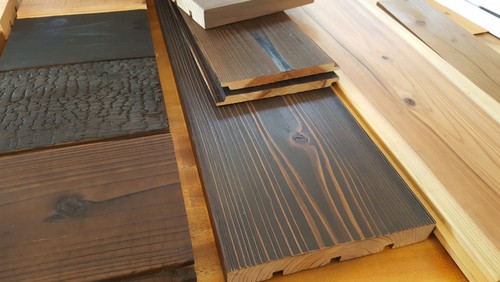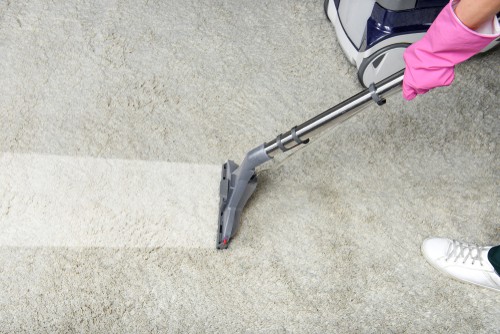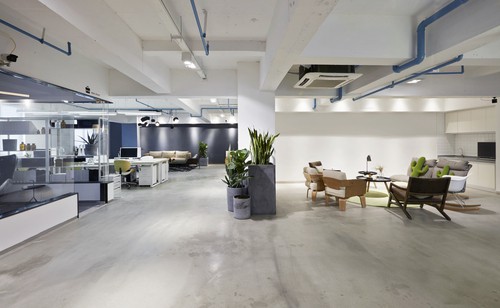
Hardwood Vs Laminate Floor (Which Is Better?)
June 20, 2022
Everything You Need to Know About Mold Under Laminate Flooring
August 23, 2022Choosing the Right Type of Office Flooring

Choosing the Right Type of Office Flooring – The flooring in your office impacts everything from its appearance to the wear and tear it sustains. The wrong flooring can lead to lost productivity, higher energy costs, and increased absenteeism. No matter what flooring material you want, it is crucial to consider it flexible, slip-resistant, and quiet.
Plenty of flooring choices are available for today’s commercial and institutional buildings. But with so many different flooring options, it can be challenging to determine the right one for your organization.
To make the best choice, it is necessary to consider several factors that affect the viability of a given material. Take some time upfront to make an informed decision about what type of flooring the office should have. Read on – Choosing the Right Type of Office Flooring:
Table of Contents
Office Flooring Types

The right office flooring type will depend on your office’s environment, where the flooring will be installed, and how much wear it will receive. Below are some commonly used flooring types that meet these criteria.
Carpet
Carpet is made out of natural or synthetic fibers. It can increase the aesthetics of an office, provide comfort for employees, help reduce noise levels, and absorb sound to reduce distractions. Carpet can be easily changed with a little cost if necessary.
Ceramic tile
Ceramic tile is a fashionable choice for many offices. While its appearance can influence your overall office design, it is a durable material that takes little upkeep and resists numerous stains, spills, and abrasions that can damage the flooring. It is also easy to clean.
Hardwood
Hardwood flooring can give an office a natural look while providing strength, flexibility, and durability. It can be stained or finished with a high level of gloss. This flooring has good resale value and should last for years with little or no upkeep.
Laminate
Laminate floors are durable and long-lasting and need little maintenance. They’re also easy to replace or change later if circumstances require it. However, they are typically more expensive than most other types of flooring.
Vinyl
Vinyl flooring is usually cheaper than many other types of flooring, but it is less durable and resists stains, etches, scratches, dents, and dings better than other materials. Its appearance, however, can be customized to give your office a detailed look.
Rubber
Rubber flooring can be made from recycled tires or materials like recycled gum rubber or polyurethane. It is durable, slip-resistant, and quiet, thus suitable for offices.
Which Flooring Is Best For Office?

The suitable office flooring material depends on your specific needs. For example, consider vinyl flooring if you’re looking for a cost-effective option resilient to everyday spills, scratches, and dents. This material is also ideal if you need an easy-to-clean floor surface – vinyl doesn’t show dirt very quickly and can be cleaned up with a damp rag.
On the other hand, consider hardwood flooring if you need a floor that is resilient to scratches and dents but can be easily cleaned (and doesn’t require any maintenance). Its natural appearance gives your office an aesthetic touch. In addition, it’s durable, strong, and resistant to moisture, making it the perfect material for offices that receive frequent foot traffic.
Maintenance Tips For Different Types Of Office Flooring

Carpet
Any dirt or dust can make your carpet look shabby, so it is necessary to vacuum often. Additionally, replace the worn areas with new carpets as soon as you can to keep your office looking neat and new.
Ceramic tile
Maintain the appearance of your ceramic tile by mopping and scrubbing the grout with a mild, non-abrasive cleaning solution. Lastly, monitor the grout for discoloration that may indicate mold growth. If you notice any, act quickly to remove the mold using a dehumidifier at and high temperature.
Hardwood flooring
To clean hardwood floors, wash them with a mixture of water and ammonia-based cleaner or use a multipurpose cleaner and water. Avoid using cleaners with waxes or oils as they can leave a residue that can make the floor slippery.
Laminate floors
You can clean laminate floors with warm water and mild soap or with a multipurpose cleaner and water. Avoid cleaning agents that leave a film as they make the floor slippery.
Vinyl floors
You can easily clean vinyl floors by mopping or vacuuming them with a general-purpose cleaner and warm water. Avoid using cleaners that leave a residue as they may make the floor slippery.
Rubber floors
If you have rubber flooring in your office, keep your floors clean and free of dust with a vacuum cleaner. If it is installed at ground level, you can use a floor scrapper to remove any dust or debris that settles on it.
How The Right Flooring Can Contribute To An Attractive Office

A well-designed office floor can contribute to a more attractive office environment. The floor’s appearance can improve the office’s overall appearance as it complements the surrounding walls and furniture. In addition, different types of flooring help to keep noise levels down, retain heat, and keep out moisture, which makes for comfortable offices in warm and cold seasons.
Flooring that is easy to clean and maintain is also crucial for any office, especially an office with multiple workers that can contribute to a messy environment, especially if the office has a lot of foot traffic. The floor covering should be resistant to dirt, stains, and scratches and should be able to be easily cleaned.
The right flooring can also contribute to a healthier workplace as it can help keep the room temperature more consistent. Regardless of what kind of flooring you use, your office must have a solid foundation to help keep the flooring from wavering in an earthquake or other unexpected event.
Choosing the Right Type of Office Flooring – Conclusion

The right flooring for your office can help create a productive and healthy work environment by keeping noise levels down and retaining heat. When choosing the right flooring material for your office, many factors should be considered, including cost, durability, appearance, maintenance requirements, and safety.
Changing the floor in your office is also an option if you feel it is necessary or wants to give it a new look without spending much money. However, it is always a good idea to have the opinion of experts in these matters before you make any decisions. Experts will provide the knowledge and guidance you need to make the right choices for your office.



